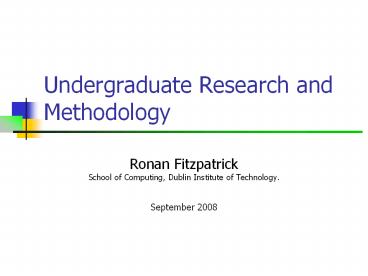Undergraduate Research and Methodology - PowerPoint PPT Presentation
1 / 25
Title:
Undergraduate Research and Methodology
Description:
Structure a product and user manual. Prepare a professional presentation ... Undergraduate project manuals in Library. Build on what you already know. Where ... – PowerPoint PPT presentation
Number of Views:139
Avg rating:3.0/5.0
Title: Undergraduate Research and Methodology
1
Undergraduate Research and Methodology
- Ronan Fitzpatrick
- School of Computing, Dublin Institute of
Technology. - September 2008
2
Overview
- This module
- Learning outcomes
- Learning and teaching methods
- Research methodology
3
Learning Outcomes
- Research and report IS topics
- Prepare a systems project proposal
- Structure a product and user manual
- Prepare a professional presentation
- Explain the content of a range of business
documents relating to systems acquisition,
project reporting and staff acquisition.
4
Learning and teaching methods
- Lectures
- Self-study
- Tutorials
- Combination of
- discussion, case study, problem solving
exercises, readings, seminars, and computer-based
learning.
5
Conclusion
- Learning outcomes
- Learning and teaching methods
6
Questions?
7
Research Methodology
- Ronan Fitzpatrick
- School of Computing, Dublin Institute of
Technology. - September 2008
8
Research
- A process of enquiry
9
Methodology
- According to Avison and Fitzgerald (1988)
- Philosophy
- Model
- Techniques (methods)
- Scope
- Outputs
- Practice
- Product
10
Research methodology
- The body of rules and methods that support a
process of enquiry - Qualitative research
- Quantitative research
11
Qualitative research
- Developed in the social sciences to enable
researchers to study social and cultural
phenomena. - Method Examples are Action research, Case study
research and Ethnography. - Data sources include Observation and Participant
observation (fieldwork), Interviews and
Questionnaires, Documents and texts, and the
Researchers impressions and reactions.
12
Quantitative research
- Developed in the natural sciences to study
natural phenomena - Method examples include
- Survey methods
- Laboratory experiments
- Formal methods (e.g. econometrics)
- Numerical methods such as mathematical modeling.
13
- Hypothesis
- Data gathering
- Data analysis
14
Literature review
- Definition
- A comprehensive study, critical analysis and
authoritative presentation of the published
research and practice in a domain of
investigation.
15
Comprehensive study
- Focus
- The focus is Information Technology.
- Width
- Seminal sources.
- Information Technology topics (PESTLE).
- Depth
- Detail to suit target audience.
- (will the audience understand).
16
Comprehensive study
- Prepare for explaining
- W6h
17
Critical Analysis
- Critique
- Comment on what is good as well as what might be
inappropriate. - Argument
- Substantiate any alternative perspective or
interpretation of the research material. - Synthesis
- Propose an enhanced alternative.
18
Authoritative presentation
- Written presentation
- Highest standard (academic and professional)
- Structure and content
- Format - Language, vocabulary and style
- Illustration and appearance
- Citation and Bibliography.
- Repeatable
- Must be possible for researchers to revisit your
sources - Explain and clarify how your synthesis is an
enhanced alternative.
19
Authoritative presentation
- Oral presentation
20
Overall impression
- Scholarly and Authoritative
- Based on seminal sources
- Dated/modern sources
- Depth breadth
- Completeness of research
- Content balance
- Argument critique - The so what? factor
- Vocabulary Evidence of having researched and
understood the domain.
21
Tips of the masters
- Read appropriate publications
- Listen to seminar presenters
- Ask questions of everybody
- Observe in places that you can access
- Think and form opinion
- Write based on what you read, hear and observe
- Read what you write, enhance it, read it again
and enhance it again at least twice.
22
Other sources
- Undergraduate project manuals in Library
- Build on what you already know.
23
Where does this fit
- The first stage of your project.
24
Your Implementation
- Ordinary degree project
- Honours degree project
- See Project coordinators website for
clarification of the requirements and differences.
25
Questions?

















![⚡[PDF]✔ Research Design in Aging and Social Gerontology: Quantitative, Qualitative, PowerPoint PPT Presentation](https://s3.amazonaws.com/images.powershow.com/10051225.th0.jpg?_=20240608119)













